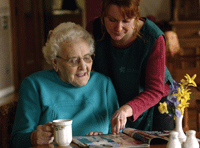
Experts have warned that the government’s Personal Care at Home Bill will make care assessments more complicated and stretch council budgets.
The proposal to provide free personal care at home for around 280,000 people may be put in jeopardy by the number of people presently funding their own care coming forward to claim the new benefit.
President of the Association of Directors of Adult Social Services Jenny Owen criticised government estimates of the cost of self-funders coming into the system. “It’s on the very extreme low end of the likely financial consequences,” she said.
The Local Government Association’s strategic lead for adult social care, Andrew Cozens, called the government’s costs, published alongside the Bill yesterday, a “stab in the dark”.
Cozens said: “It’s very difficult to plan when we don’t know.”
The government estimates around 66,000 people presently self-funding their care will wish to receive free personal care.
Cozens estimated that the cost of providing the free care would be around £2.5m for each council. He said he was worried about the “open ended nature” of the duty placed on councils to fund this. He also said leaving the costs to efficiency savings went against the spirit of the adult social care green paper which aimed to put more money into the system.
Assessment
Owen also said the government was creating a system which would lead to rises in administrative costs for councils as the assessment system was too complicated. She said: “We are trying to make assessment process as lean as possible and this is not allowing for a lean assessment process.”
She said there was a lack of clarity over what constituted the need to assistance with certain daily living tasks such as eating, arguing that whether this referred to preparation of food, feeding or cooking was open to interpretation.
Reablement hurdle
Sector leaders welcomed the ability to ensure people had undergone reablement services before being eligible for free personal care. United Kingdom Home Care Association’s head of policy Colin Angel said: “We believe that the use of reablement services are a very positive and logical one to promote the independence of people who use services and a prudent use of finite resources.”
Owen said this was in line with present policy to encourage councils to develop re-ablement services under the Putting People First agenda.
Related articles
Free home care plan to exclude some with critical needs
Is spending on domiciliary care rather than care home places more effective?


 Bournemouth, Christchurch and Poole
Bournemouth, Christchurch and Poole  Hampshire County Council
Hampshire County Council  Lincolnshire County Council
Lincolnshire County Council  Norfolk County Council
Norfolk County Council  Northamptonshire Children’s Trust
Northamptonshire Children’s Trust  South Gloucestershire Council
South Gloucestershire Council  Wiltshire Council
Wiltshire Council  Wokingham Borough Council
Wokingham Borough Council  Children and young people with SEND are ‘valued and prioritised’ in Wiltshire, find inspectors
Children and young people with SEND are ‘valued and prioritised’ in Wiltshire, find inspectors  How specialist refugee teams benefit young people and social workers
How specialist refugee teams benefit young people and social workers  Podcast: returning to social work after becoming a first-time parent
Podcast: returning to social work after becoming a first-time parent  Podcast: would you work for an inadequate-rated service?
Podcast: would you work for an inadequate-rated service?  Family help: one local authority’s experience of the model
Family help: one local authority’s experience of the model  Workforce Insights – showcasing a selection of the sector’s top recruiters
Workforce Insights – showcasing a selection of the sector’s top recruiters 

 Facebook
Facebook X
X LinkedIn
LinkedIn Instagram
Instagram
Comments are closed.